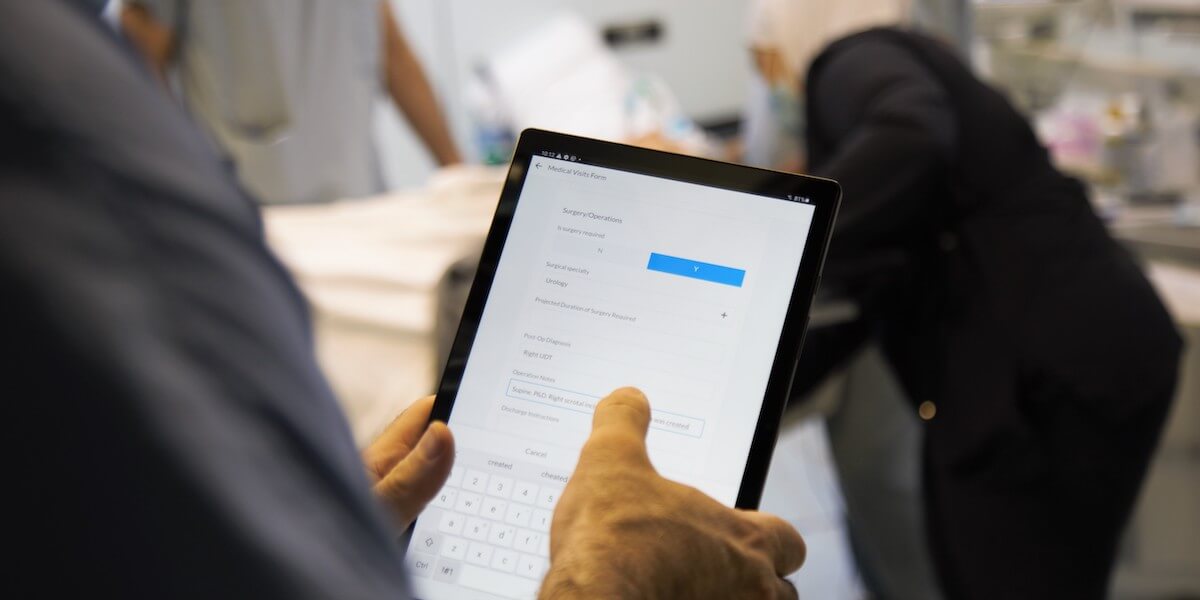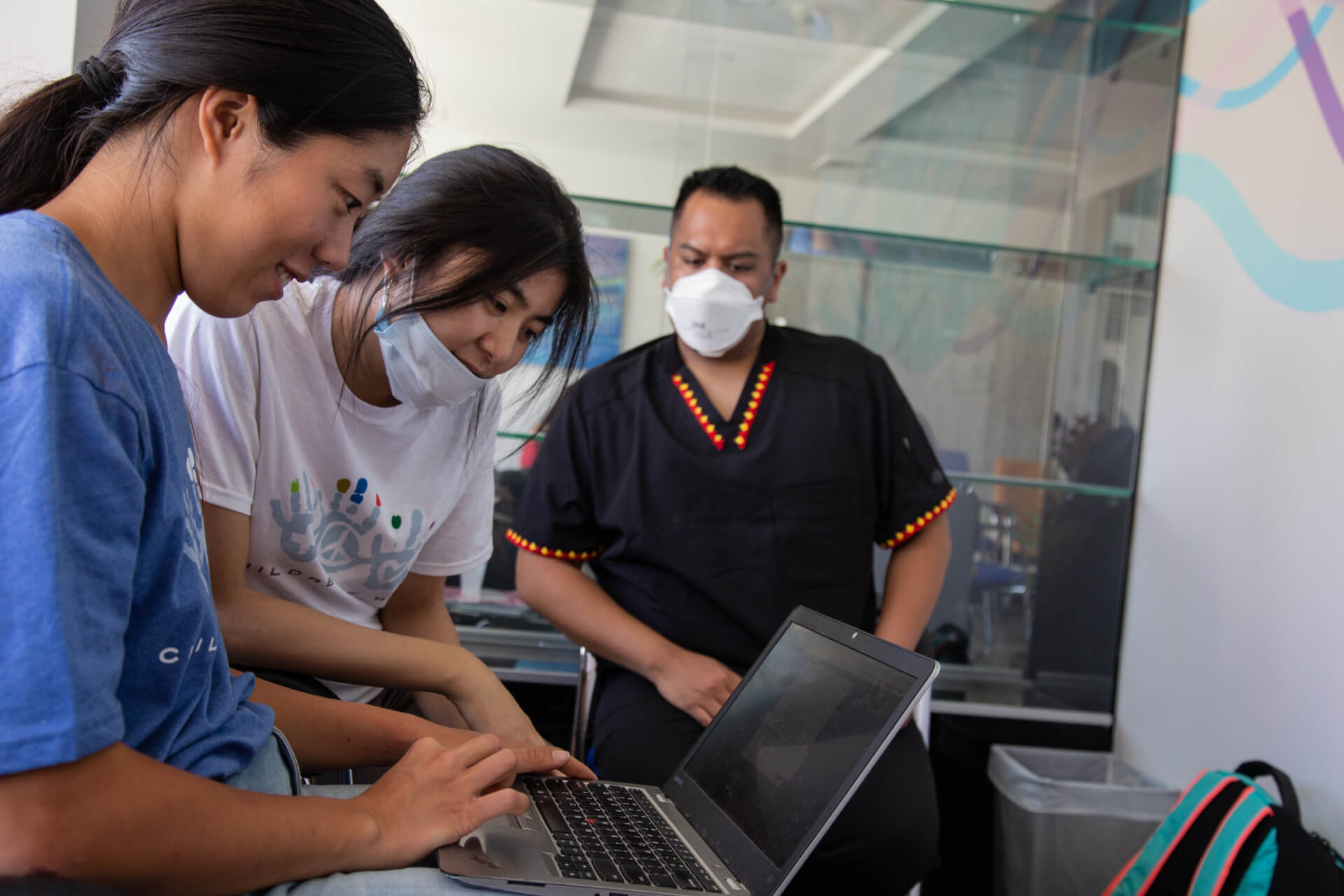
A surgeon using the Frontida Electronic Medical Records system to enter notes after a procedure. PHOTO/ Frontida Records.
Growing up in a medical family, Frontida Records founder Lauren Yen, ’21, learned early on about electronic health records and the complexities of converting paper filing systems into effective, easy-to-use digital systems for clinicians.
The problem, learned Yen, is that all the prevailing digital record management systems are not customizable and fail to support low resource communities and the providers who serve them.
“It occurred to me early on the question of how to make digital records efficient for the people you’re serving,” said Yen, who earned her bachelor’s degree in biological sciences at the USC Dornsife College of Letters, Arts and Sciences. “Because the process takes a lot of hours and attention from physicians, and what works in one setting doesn’t work in another.”
After learning about digital records management working with her parents, Yen’s interest in the area deepened when she visited Camp Moria (which has since burned down in 2020) — then the largest refugee camp in Europe, in Lesvos, Greece — as a student enrolled in a USC Viterbi School of Engineering course on global innovation (CE 486). “The digital records systems are structured quite differently than how someone serving a refugee camp would want to structure their health record system,” Yen said. “Some refugees don’t have a social security number to search by and there aren’t insurance IDs either.”
Since then, the team has visited low resource clinics and hospitals serving refugees in Panama and most recently, Jordan, to help set up digital records systems that work for the medical providers and patients in question. Categorizations that work for westernized healthcare, like in the United States, are not easily applicable in other settings, particularly as digital records systems have been created as one-size-fits-all up until now. The core mission of Frontida Records is to support these scenarios in which physicians require customizable workflows, but can’t spend a lot of money or time reworking existing market solutions.
The original team of students who founded Frontida Records has evolved to a team of 20 to 30 that for the first-time includes part-time employees thanks to fundraising that includes a recent second place award of $15,000 from the USC Marshall School of Business New Venture Seed Competition and $40,000 from the Wesley Foundation.
USC Viterbi student Yuwei Xi, Frontida’s head of product development, said settings like Camp Moria are spaces where healthcare providers have unreliable internet, minimal funding and little time. “Clinicians have an urgent need to quickly document, analyze and react to medical data, particularly following the COVID-19 pandemic, where already vulnerable populations were being hit even harder.”
“At Frontida, we address the problem by leveraging the power of no-code tools for affordable, fast app development and deployment,” Xi, a computer science major, said.
The team also emphasizes input from healthcare providers in the design process, to make sure that the applications work efficiently to address the needs of the people it is serving, Yen said.
Low Costs, Low Code
Access, ease and flexibility continue to be crucial to Frontida’s ability to fulfill its mission. Unlike the electronic record systems many physicians use in the United States in typical clinical settings, the Frontida team promotes simple, user-friendly solutions for their clients.
“Simplication really matters in these communities, especially when some have not been introduced to this type of technology before … so it’s actually a plus that it’s simplified,” Yen said.

Frontida team setting up electronic medical record (EMR) system in field. From left to right: left to Yuwei (Ria) Xi, Lauren Yen, and Joshua Manlutac. PHOTO/Frontida Records.
While there are certain costs associated with maintaining the system, Frontida Records does its best to defray expenses and puts need over cost as much as possible. They have a fee for licenses and software development that the team asks clients to pay for, but Frontida says its mission is to make sure every single clinic has the technology it needs, regardless of ability to pay. To help support this mission, Frontida has a separate fund that can cover or reduce the cost of the application for clients who need it.
Continuing Education
Unlike the one size fits all solution, Frontida Records is ever-evolving and adapting. Key to its success is continued partnership with health providers and people close to the communities these providers are serving – those who understand best how to assess their long-term and short-term health risks.
For Frontida, the drivers of innovation and success are understanding the needs of the people it is serving. The team has a core set of eight values that it tries to adhere to in its work; one of these is to keep learning – in other words, to stay humble.
Said Yen: “Healthcare varies in places with different patients and cultures. For example, when we were in Panama, the Frontida team realized that we needed to keep track of how much Chocolisto a patient drinks because it’s a common chocolate beverage in Panama. The physicians in Panama wanted to keep records of the patients’ consumption of this drink, so we added this data entry to our digital form, as it’s an important indicator of sugar intake and risk of diabetes. We realized that we have to adapt to such needs and be able to keep track of important culture- and context- specific health indicators of these communities.
USC Partnership
Frontida Records has deep roots at USC and seeks to continue that partnership as it expands, both through student internships and mentorship and through USC-based incubators, such as USC Viterbi Startup Garage.
Said Yen: “USC will always be a part of Frontida’s origin story. I’m really grateful for how much investment, time and resources they put into us.”
Frontida Records is open to USC students looking to join. Please see https://www.frontidarecords.org for more information!
Published on August 15th, 2022
Last updated on August 15th, 2022












